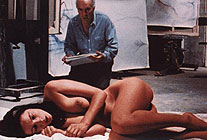|
|
|
|
La
Belle noiseuse
|
 |
|
Films about artists are always risky. Filmmakers take on the worst clichés – the romantic genius in the garret, the tormented soul projected onto canvas – when they try to show just what it is that an artist must go through in order to shape desires, intuitions, ideas and sensations into a material, crafted work. Jacques Rivette accepts the challenge gleefully in La Belle noiseuse, upping the ante still further by drawing a central idea from a short story by Balzac: the excruciating tale of a chef-d'ouvre inconnu (unknown/veiled masterpiece), produced and then hidden by a famous artist who returns to his vocation in the twilight years of his life. Rivette and his writers, Pascal Bonitzer and Christine Laurent, juggle many themes skilfully here. As always in Rivette, it is a story about dynamic, social, group relations – this time, set in the privileged world of art, where creators, dealers, confidants and ambitious young things enter into a quietly erotic tangle for a piece of power or influence. But once the secondary characters falls away, Rivette studies, with a minute attention to detail and duration, the rapport between an artist, Frenhofer (Michel Piccoli) and his model, Marianne (Emmanuelle Béart), who is naked most of the time. Their sessions wheel through many moods: exuberance, aggression, frustration. The master-slave relationship shifts. Slowly, through many trials, an artistic work takes its form. La Belle noiseuse was an unexpected commercial success for Rivette, and revived a career which many thought had stagnated since the mid '70s. It announced a more classical turn in his work: clean soundtracks, linear plots and greater emphasis than ever on the filmmaker's most elemental tool, the mise en scène of choreographed bodies in a set or landscape. One need only study the splendid scene of the first work session between Frenhofer and Marianne – his nervous but steady setting-up of the room, her open expectancy – to see how Rivette conjures all human relationships, even the most tense or difficult, in the form of a dance. Also new for Rivette is his expression of a profoundly melancholy feeling concerning age and mortality. As Frenhofer faces the disturbance in his marriage to Liz (Jane Birkin), warily watches the emergence of a new generation and confronts the spectre of his own death, it is hard not to see in this sad hero the director's self-portrait. MORE Rivette: Va Savoir, Out 1: Noli me tangere, Lumière and Company, The Nun © Adrian Martin January 1992 |
![]()